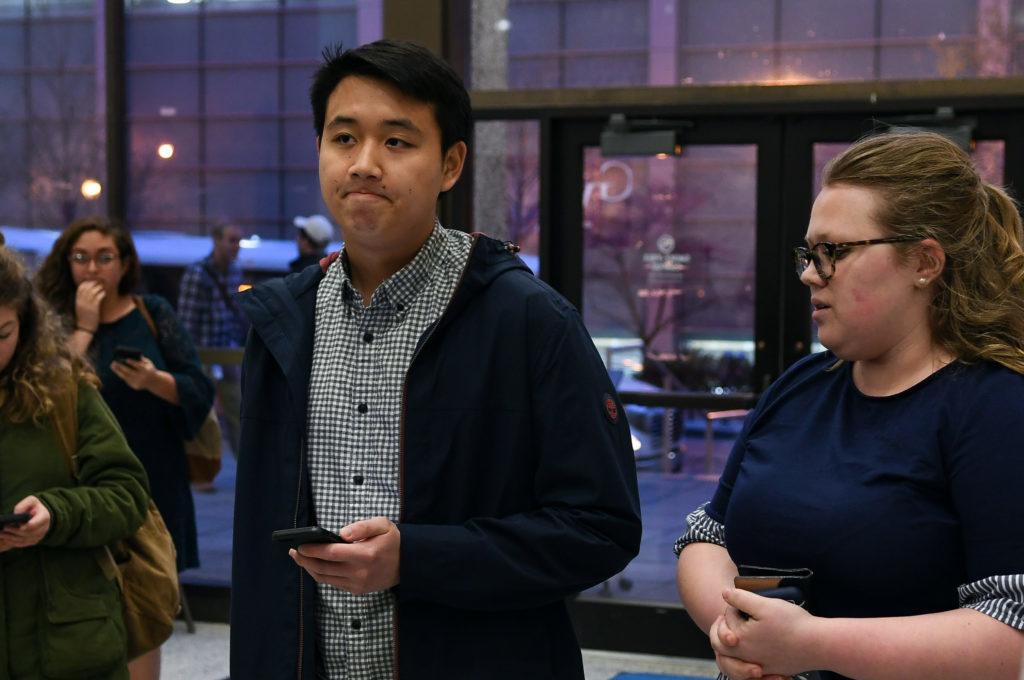Updated: April 17, 2018 at 12:18 p.m.
Leaders of the Student Association Senate called off a vote on a controversial pro-Palestinian divestment resolution Monday amid concerns about a lack of security to safeguard the senate meeting.
Just 10 minutes before the meeting was scheduled to start at 8 p.m., SA President Peak Sen Chua read a statement announcing that the meeting had been canceled after officials declined repeated requests to have University Police Department officers stationed in the meeting room in Funger Hall. After students on both sides of the issue raised alarm about the lack of police presence, top SA leadership – including Executive Vice President Sydney Nelson and senate committee chairs – declined to attend the meeting, automatically canceling it.
“Despite repeated requests made by the Student Association to the GW Division of Safety and Security, GW Police Department has rejected all requests for posted security in Funger,” SA leaders wrote in a statement. “There are significant security concerns for both students and senators that are going unaddressed by the University.”
Nelson said SA leadership had been in contact with UPD since the resolution – which called for the University to divest from companies that allegedly contribute to Palestinian human rights abuses – was introduced about three weeks ago. She said that any time SA leaders expect a high turnout at a meeting, they request UPD presence.
Students on both sides of the resolution voiced safety concerns in the days leading up to the meeting, Nelson said. Pro-Palestinian student groups found posters deemed threatening to the resolution’s supporters around campus Sunday night, less than 24 hours before the meeting was set to begin.
Nelson said after the posters were found Sunday, officials “gathered their threat assessment team and determined that additional presence was not needed, even if we offered to pay for it.” She said the SA pressed for posted security in the Funger Hall room, but officials planned only routine patrols in the area.
“The University was not legitimately validating concerns, or prioritizing the needs and safety of students in the conversation,” Nelson said. “We did not feel comfortable moving forward with a senate meeting without that support.”
University spokeswoman Lindsay Hamilton said UPD had been aware of the upcoming senate meeting for several weeks and monitored activity leading up to the debate, but officials “believe there was no credible physical threat directed at the SA meeting.” She said UPD officers patrolled the area around Funger Hall and were present before the meeting was scheduled to begin to “ensure events could take place normally.”
“The safety of our students is the primary concern of the GW Police Department and the Division of Safety and Security,” Hamilton said.
With just one meeting left on the calendar for this year’s senate, Nelson said “it’s too soon to tell” whether the resolution will have another chance for debate because senators still need to pass the annual SA budget, which funds student organizations.
Ahead of the meeting Monday, more than 100 students filed into Funger Hall to voice opinions about the legislation. The meeting had been moved from its usual location in the Marvin Center to accommodate hundreds of students who planned to turn out to the debate. Supporters of the resolution said it was a way for the University to acknowledge Palestinian suffering, but supporters – many from pro-Israel groups – have called it divisive and circulated petitions denouncing the measure.
Senators planned to introduce the resolution for the second consecutive year, after a similar version of the proposal failed by just one vote after a contentious debate last spring.
Former SA Executive Vice President Thomas Falcigno, who chaired last year’s more than five-hour-long meeting, said in a Facebook comment that SA leadership had similar safety concerns last year and UPD provided a “soft presence in the area” – meaning that officers were nearby if an issue broke out.
“In my experience with GWPD, they set a precedent last time where they would help out with these types of situations,” Falcigno said in an interview. “I don’t understand why they aren’t helping out now.”
Sen. Andrew Lama, ESIA-U, and the chair of the student life committee, said SA leadership convened to call off the meeting because UPD repeatedly declined student requests for bag checks and pat-downs. Officers “continuously got back to us saying that they saw no threat” ahead of the meeting, which “runs contrary to the reports we received from dozens of senators,” he said.
“This is largely on the University,” Lama said. “This is in no way something that we wanted or were waiting to have happen.”
Rebecca Bizzarri, the senate chief of staff, said SA leaders also received several alarming emails leading up to Monday’s meeting – including several that compared senators to Nazis.
Sen. Jessica Martinez, CCAS-G, and a sponsor of the resolution, said the cancellation was “disheartening” because senators were not able to voice their opinions about the resolution and “we should be able to express our views.” She said supporters of the resolution repeatedly told UPD they were worried about their safety, but officials didn’t address their concerns.
“I think as a senator, the most painful thing for me is we have this democratic institution, and we’re trying to simply have this conversation, and UPD doesn’t take our concerns seriously,” she said. “UPD hasn’t taken the concerns of marginalized students seriously.”
Lillian Bautista, Arianna Dunham, Jared Gans, Dani Grace, Lizzie Mintz, Sarah Roach and Meredith Roaten contributed reporting.





